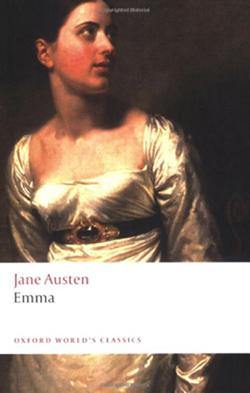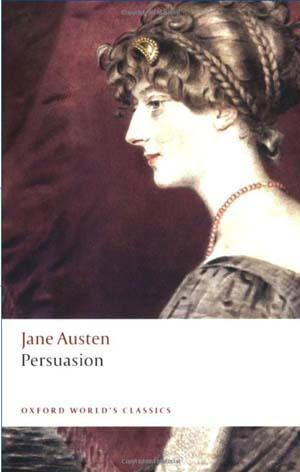Persuasion: An Overview
Persuasion is Jane Austen's last completed novel. She began it soon after she had finished Emma, completing it in August, 1816. She died, aged 41, in 1817, but Persuasion was not published until 1818.
Persuasion is connected with Northanger Abbey not only by the fact that the two books were originally bound up in one volume and published together two years later, but also because both stories are set partly in Bath, a fashionable health resort with which Jane Austen was well acquainted, having lived there from 1801 to 1805. Readers of Persuasion might infer Jane Austen intended 'persuasion' as the working theme of the story. Certainly that theme is repeated several times, with vignettes within the story as variations on that theme. On the other hand, there is evidence that Austen did not have in mind such an explicit theme and variations. It even appears she did not envision the title of the story as Persuasion; there is speculation that the title of the novel was chosen by her brother Henry or her sister Cassandra. Henry had long championed his sister's writing, especially in business and publishing circles where he had more access than Cassandra. After Jane's death it was he who arranged for publishing the novel, perhaps naming it in the process. Another speculation is that the two siblings collaborated in choosing the title. Some critics believe Austen intended to name the novel The Elliots but that she died without titling it.
Plot Summary
Anne Elliot is the overlooked middle daughter of the vain Sir Walter Elliot, a baronet who is all too conscious of his good looks and rank and spends excessive amounts of money. Anne's mother, a fine, sensible woman, is long dead, and her elder sister, Elizabeth, resembles her father in temperament and delights in the fact that as the eldest daughter she can assume her mother's former position in their rural neighborhood. Anne's younger sister, Mary, is a nervous, clinging woman who has made an unspectacular marriage to Charles Musgrove of Uppercross Hall, the heir to a bucolic but respected local squire. None of her surviving family can provide much companionship for the elegant-minded Anne, who, still unmarried at 27, seems destined for spinsterhood. After she met and fell in love with Wentworth, at age nineteen, Anne had been persuaded by her mother's great friend —and her own trusted confidante, the widow Lady Russell— to break the engagement. Lady Russell had questioned the wisdom of Anne marrying a penniless young naval officer without family or connections and whose prospects were so uncertain. Wentworth is left bitter at Lady Russell's interference and Anne's own want of fortitude. Wentworth re-enters Anne's life when Sir Walter is forced by his own profligacy to let the family estate to none other than Wentworth's brother-in-law, Admiral Croft.
Wentworth's successes in the Napoleonic Wars resulted in his promotion and enabled him to amass the then considerable fortune of £25,000 (around £2.5 million in today's money) from prize money awarded for capturing enemy vessels. The Musgroves, including Mary, Charles and Charles's younger sisters, Henrietta and Louisa, are delighted to welcome the Crofts and Wentworth to the neighborhood. Both Musgrove girls are attracted to Wentworth, though Henrietta is informally engaged to clergyman cousin Charles Hayter. Hayter is viewed as a merely respectable match, being a bit beneath the Musgroves, socially and financially. Charles, Mary, and the Crofts continually speculate as to which one Wentworth might marry.
All this is hard on Anne, due to her regret at breaking off the engagement and Wentworth's constant attention to the Musgrove girls. She tries to escape their company as often as she can, preferring to spend time with her nephews. Captain Wentworth's visit to a close friend, Captain Harville, in nearby Lyme Regis results in a day-long outing being organized by those eager to see the resort. While there, Louisa Musgrove sustains a concussion in a fall brought about by her own impetuous behaviour.
This highlights the difference between the headstrong Louisa and the more sensible Anne. While onlookers exclaim that Louisa is dead and her companions stand around dumbfounded, Anne administers first aid and summons assistance. Wentworth's admiration for Anne reawakens as a result. Louisa's recovery is slow and her self-confidence is severely shaken. Her newfound timidity elicits the kind attention and reassurance of Wentworth's friend Captain Benwick, who had been mourning the recent death of his fiancée. The couple find their personalities to be now more in sympathy and they become engaged. Meanwhile, Sir Walter, Elizabeth, and Elizabeth's scheming friend Mrs. Clay, the widowed daughter of Sir Walter's agent, have relocated to Bath. There they hope to live in a manner befitting a baronet and his family with the least possible expense until their finances are restored to a firmer footing.
Sir Walter's cousin and heir, William Elliot, who long ago slighted the baronet, now seeks a reconciliation. Elizabeth assumes that he wishes to court her, while Lady Russell more correctly suspects that he admires Anne. Although William Elliot seems a perfect gentleman, Anne distrusts him; she finds his character disturbingly opaque. She is enlightened by an unexpected source when she discovers an old school friend, Mrs. Smith, living in Bath in straitened circumstances. Mrs. Smith and her now-deceased husband had once been Mr. Elliot's closest friends. Having encouraged them into financial extravagance, he had quickly dropped them when they became impoverished.
Anne learns, to her great distress, of his layers of deceit and calculated self-interest. In addition, her friend speculates that Mr. Elliot wants to reestablish his relationship with her family primarily to safeguard his inheritance of the title, fearing a marriage between Sir Walter and Mrs. Clay. This helps Anne to understand more fully the dangers of persuasion—in that Lady Russell pressed her to accept Mr. Elliot's likely offer of marriage—and helps her to develop more confidence in her own judgment.
Ultimately, the Musgroves visit Bath to purchase wedding clothes for their daughters Louisa and Henrietta (who has become engaged to Hayter). Captain Wentworth and his friend Captain Harville accompany them. Anne and Harville discuss the relative faithfulness of men and women in love, while Wentworth writes a note within earshot of the discussion. This causes him to write a note to Anne detailing his feelings for her. In a tender scene, Anne and Wentworth reconcile and renew their engagement. The match is now more palatable to Anne's family — their waning fortunes and Wentworth's waxing ones have made a considerable difference. Also, ever overvaluing good looks, Sir Walter is favorably impressed with his future son-in-law's appearance. Lady Russell admits she has been completely wrong about Captain Wentworth, and she and Anne remain friends. Literary significance & criticism
Persuasion is widely appreciated as a moving love story despite what has been labelled as a simple plot, and exemplifies Austen's acclaimed wit and ironic narrative style. Austen wrote Persuasion in a hurry, during the onset of the illness from which she eventually died; as a result, the novel is both shorter and arguably less polished than Mansfield Park and Emma, and was not subject to the usual pattern of careful retrospective revision.
Although the impact of Austen's failing health at the time of writing this novel cannot be overlooked, the novel is strikingly original in several ways. Persuasion is the first of Austen's novels to feature as the central character a woman who, by the standards of the time, is well past the first bloom of youth; biographer Claire Tomalin characterizes the book as Austen's "present to herself, to Miss Sharp, to Cassandra, to Martha Lloyd . . . to all women who had lost their chance in life and would never enjoy a second spring." At the same time, the novel is a paean to the self-made man. Captain Wentworth is just one of several naval officers in the story who have risen from humble beginnings to affluence and status on the strength of merit and luck, not by inheritance. It marks a time where the very roots of society were changing, as 'old money' (exemplified by Sir Walter) had to accommodate the rising strength of the nouveau riche (such as Wentworth).
The success of Austen's own two brothers in the Royal Navy is probably significant. There are also clear parallels with the earlier novel Mansfield Park as there are inherent and sustained messages of the importance of constancy in the face of adversity and of the need to endure. Austen makes some biting comments about 'family' and those we choose to associate with. Mary wants to nurse Louisa but doesn't want to nurse her son. Elizabeth prefers Mrs Clay to her sister who is 'amongst the nobility of England and Ireland', yet courts the attentions of Lady Dalrymple.
Through her heroine's words, Austen makes pointed remarks about the condition of women as 'rational creatures' at the mercy of males (only) recording history, writing books, etc., while castigating women's "inconstancy" and "fickleness". "Men have had every advantage of us in telling their own story. ...the pen has been in their hands. I will not allow books to prove anything" (Persuasion Volume 2 Chapter 11). She ends the novel with the similar theme to Pride and Prejudice, where the heroine leaves the others behind with marriage.
You can buy all of Jane Austen's novels at our online giftshop - click here to browse.
From Wikipedia.com




Leave a comment
This site is protected by hCaptcha and the hCaptcha Privacy Policy and Terms of Service apply.